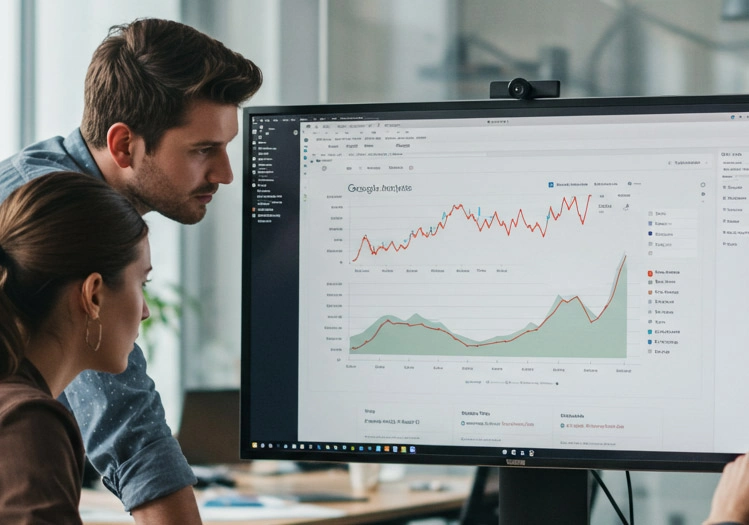Top SEO tips for any type of website
Posted on
- 18 January 2022
When it comes to SEO, everyone has their own take on it. Whoever you work with, whether it is a large digital marketing agency or not, they will have their spin on how to do search engine optimisation. At the end of the day, the only thing that matters is results. Campaigns and work implemented may be slightly based on industry and being an Ecommerce or serviced-based business however, these are our best SEO tips that you can utilise for most websites which will get you results if done properly.
Please note, that these tips are not for a whole SEO strategy, it is just to assist you in getting your client some quick initial results in the first few months of the SEO campaign.
The XML sitemap must be added and indexed in Google search console
The sitemap allows Google to quickly find and crawl your website’s pages as well as understand its structure. This must be added to the Google Search Console for your website no matter the type or size.
As simple as this sounds you need to double-check when adding your website’s sitemap in the search console. A lot of the times we have found that once the sitemap is added it says there is an ‘error’ or ‘couldn’t fetch’. A simple solution to this is to just refresh the page! If that does not work you may need to add all of the website’s XML sitemaps individually as per below.
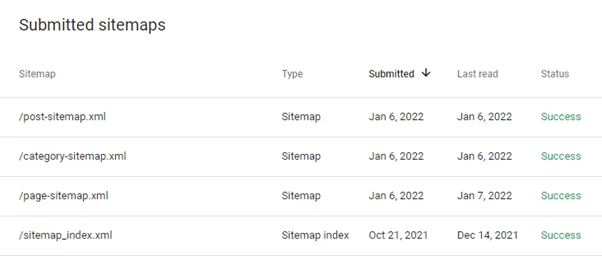
Make sure plugins are not causing major site speed issues
Plugins, lifesavers really, well most of the time. Plugins are website add-ons that allow websites to gain new functionalities without having them be developed from scratch. Depending on the plugin, some are larger than others which means they require more resources on the website and server which may cause the website to load slower. Website speed is very important. When adding a plugin it is important to read reviews, as well as the description thoroughly. Run speed tests before and after plugins are added. Sometimes you may need to set up and test a few similar plugins to see which one gets you the best results in terms of bunch functionality and speed. Run the tests for both desktop and mobile versions of the website. You may need to trade-off some functionality for better speed and vice versa depending on your website needs.
All top-level SEO changes should be in line with the main search terms targeted
You have researched your keywords, you have assigned them to their most appropriate pages for targeting and now you need to get them ranking. Yes, most SEO takes a few months before you can appreciate some results however, there is a lot of low-hanging fruit to be picked from making top-level changes. When we say ‘top level’ we mean changes to URLs (and URL structure if needed), meta titles and descriptions as well as some main H1 heading changes. Canonicals are mostly handled correctly by your CMS so we can get into this on another topic if need be.
As these are all at the top level of the website, Google will see these first when crawling a page starting from the URL then moving down the page to meta and headings – as well as content, scripts, canonical, and so forth in between. Since they are looked at first they tend to hold more value and this has shown in many of the campaigns we have worked on, we have seen really quick results within weeks of making these changes correctly. The meta description will not have an impact on your rankings however, it is a call to action which can entice a browser to click onto your website.
Below is an example of ranking improvements for a new client after top-level changes were implemented. See the case study here for more insights.
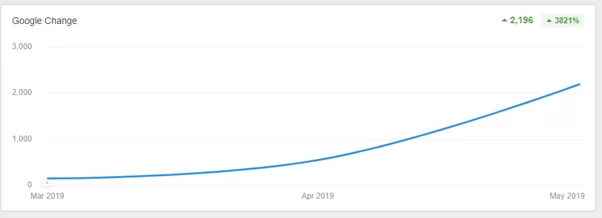
So, make sure you are targeting the right keywords, assigning them to the right pages, and making the necessary top-level changes to yield faster results.
Content must be created in line with user experience
We see this all too often. People are creating content just to stuff keywords in or create content just for the sake of creating content to have their website updated. Your content must serve a purpose, it must make you stand out from the rest of the hundreds of millions of websites in the search results.
If someone is searching “flat pack desks” why should Google rank your website among the other 9,100,000 indexed pages? Looking at the top-ranking website we can immediately see what it is about from even the search results. When we click onto the website we can see it is in line with our search term and the content on the page quickly gets to the point without any ‘fluff’ and keyword spamming. There are also products that support our search with well-presented images.
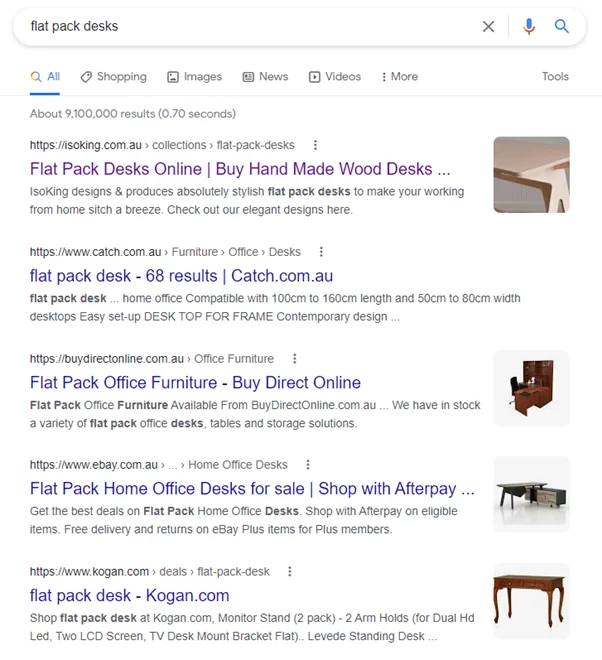
Remember, when we talk about content, we don’t only mean the text on the page, content is also made up of images, videos, call to action, headings, products, reviews, snippets, FAQs, and really anything you will find on a web page which can be customised. So, no need to worry, there are plenty of ways to make your webpage unique and really stand out whilst serving a purpose and promoting a positive user experience.
Content must not be copied from other parts of the website, organisation, or affiliates
We all know by now not to copy content from any other websites but believe it, or not, this is a tricky one when it comes to copying content from your own websites or affiliates, and most of the time people don’t even know they are doing it!
Something as basic and innocent as a small paragraph at the end of a website footer can cause some issues as it is replicated across all pages of a website.
Larger organisations may also have multiple websites across different countries providing the same services. So a lot of the time the content is the same or very similar which can cause them to cannibalise results or even get penalised for ranking at all. Furthermore, many SEO agencies think a simple solution to this is by adding geographical targeting and specifying the language of that page, known as hreflang tagging. So for example, saying that a particular page is targeted towards people who read English in Spain which we would want the content to rank in Spain. This is unfortunately not enough. It won’t be that easy just to have duplicated versions of your website targeting around the world and hope to rank everywhere by simply putting some hreflang tag codes. Using hreflang tags does not solve your duplicate content issues!
If you have multi-sites, content must be created for each of the audiences you are targeting geographically with the correct hreflang tags to support. This is a large job but when done correctly you can expect much better results but, at the same time think of the trade-off between resources needed and results gained. This will be dependent on your line of work and revenue within your industry.
Duplicate content is one that is all too common is for eCommerce websites and drop shippers or affiliates. When people are also stocking your products on their websites you will give them a data feed of your products so they can quickly start advertising for you. The main problem with this is that the data feed is all the same content that is showing on your website product pages. This can not only cause a problem to the drop shipper but also to you as they may even outrank you on your own products! A good workaround for this is to have a separate data feed with different product descriptions, information, and slightly different names. It can take a bit of time to get this all organised but at least other people won’t be outranking you on your own products!
Your website should be updated as much as needed
It’s really funny how many search engine optimisation agencies simply do a couple of housekeeping tasks when a new SEO client comes on board, uploads content, and then leave it at that whilst charging monthly fees. If your website is not being updated and just sitting there, why should Google rank you above your competitors?
We don’t recommend changing your SEO target pages often unless you have new changes to your services or products. A simple blog can assist in getting your website updated, but remember, don’t create blogs just for the sake of creating content. Your content must serve a purpose.
There is no correct answer on how often you should update your website, as long as it is active and being updated as needed you shouldn’t have any issues.
Backlinks must serve a purpose
This is a big one. Just like content, backlinks must serve a purpose. If you really think about it, you would only want your website mentioned on other similar websites or articles talking about subjects that are related to your business.
If you are thinking you can participate in link schemes and offshore all your backlink activities at very low costs then you shouldn’t be surprised when Google penalises your website. We have worked with companies that used to outsource this and it did showsome good results for a few months however, once Google caught on those results were gone almost overnight due to a manual penalty – a manual penalty is when a staff member at Google personally penalises the website. Due to the size of the business we couldn’t just start again, it took nearly one year to fix the problem as the tools kept on finding bad backlinks every month which we had to go and remove or disavow one-bye-one out of millions!
So before you go and get your website mentioned anywhere ask yourself, the following:
“What is my business trying to achieve by being mentioned here?”
“Is this website (or article) relevant to what my business is?”
“Will this backlink help people who are seeing this page?”
Of course, it can be a long process to be accepted and mentioned elsewhere, as well as expensive, which is where we come in and make sure this is all done for you, the correct way.
Don’t have any broken links or pages on your website
This should be part of your SEO housekeeping once a month. Go into your Google search console and check the ‘coverage’ section to identify any pages that are broken and cannot be found.
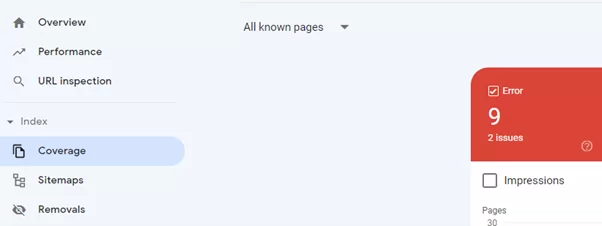
Old pages or products that are not coming back should be permanently redirected (301) to the next closest matching page. You can also temporarily redirect (302) a certain page if you will be adding it back again soon since you don’t want people going to a broken page.
In addition to broken links, the search console can also show you pages that have failed to load due to server issues so you can also troubleshoot these as well. There are also other tools outside of Google that allow you to gain further insights into the crawl results and page status of your website.
SEO is definitely getting more challenging, and for good reason. In saying that, from implementing the above, we have been able to see quick results in just about all of our search engine optimisation campaigns. Will this work for your website? It should, as long as it is done properly, and of course, by Digital Debut!
